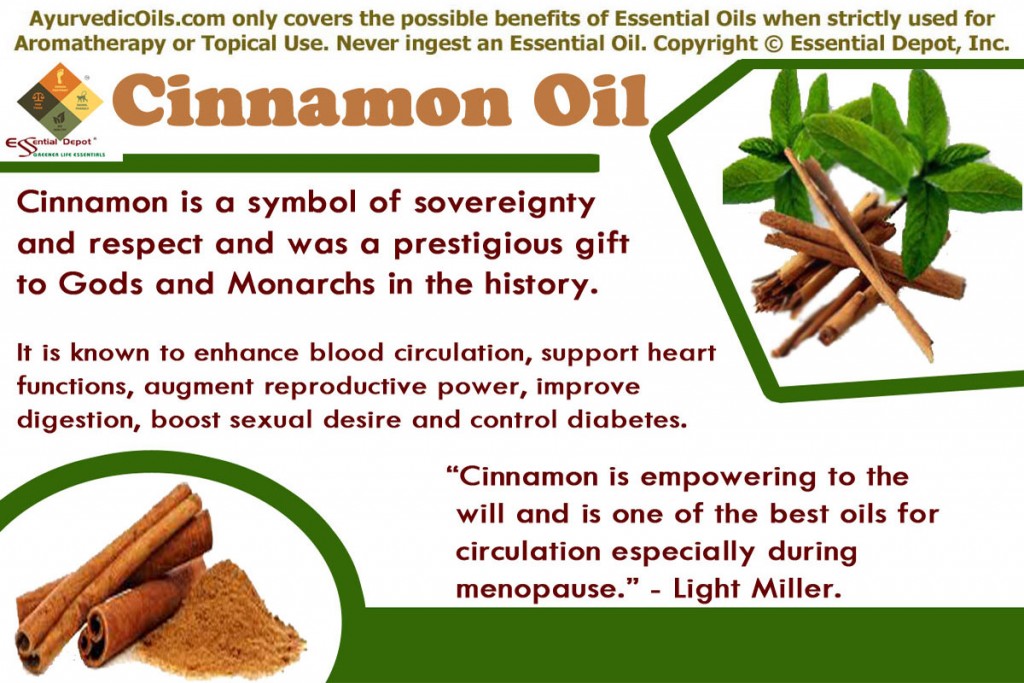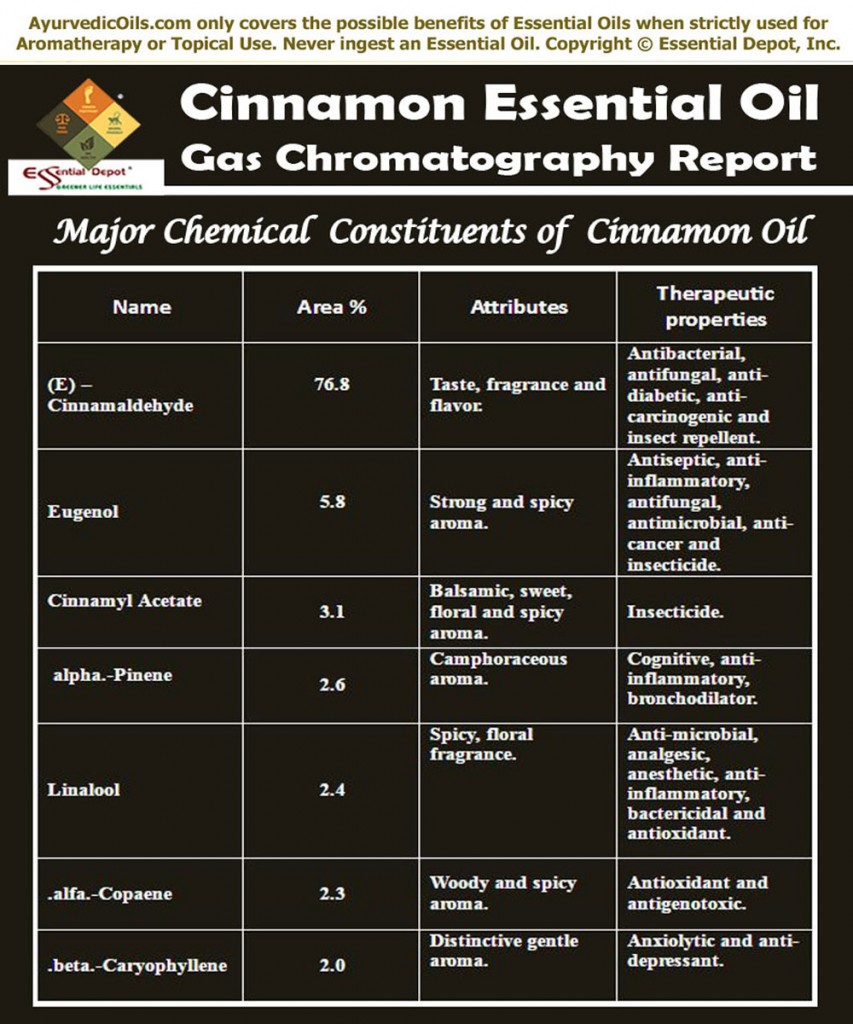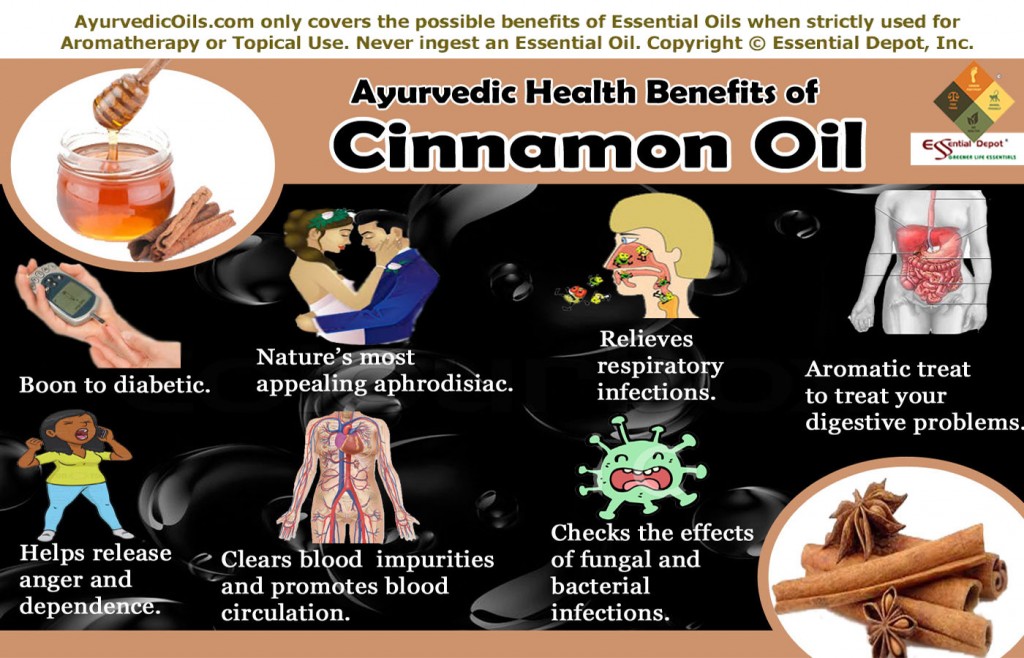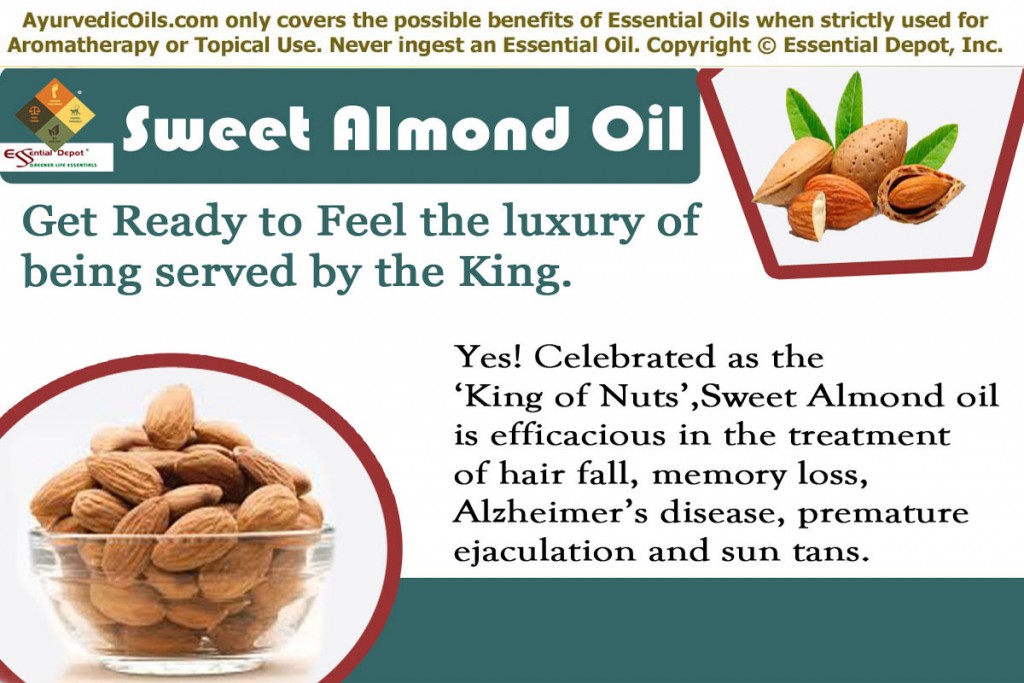Fêted as the ‘herb of grace’ and ‘the thinking person’s herb‘, Brahmi oil gifts you mental clarity by alleviating all kinds of mental ailments with its neuro-pharmacological effects.
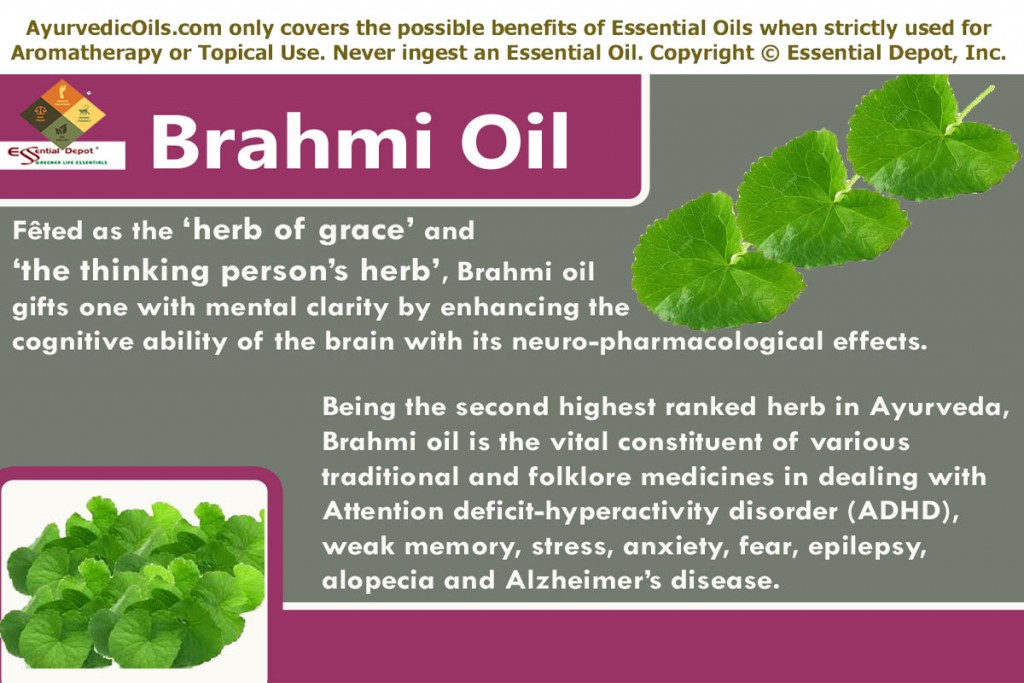 Being the second highest ranked herb in Ayurveda, Brahmi oil is the main component of numerous traditional and folklore medicines in dealing with Attention deficit-hyperactivity disorder (ADHD), weak memory, stress, anxiety, fear, epilepsy and Alzheimer’s disease.
Being the second highest ranked herb in Ayurveda, Brahmi oil is the main component of numerous traditional and folklore medicines in dealing with Attention deficit-hyperactivity disorder (ADHD), weak memory, stress, anxiety, fear, epilepsy and Alzheimer’s disease.
Commonly called as ‘Brahmi’ in Ayurveda, “it is known as the rejuvenator for all systems in the body and is one of the most commonly used medicated oils”, quotes the book on Ayurveda and Aromatherapy. As a cognitive enhancer, stress buster and neurological tonic, Ayurveda widely uses Brahmi oil for its nootropic, antimicrobial, anti-aging, antipyretic, cardio-tonic and analgesic attributes.
The oblong juicy leaves of this herb, when put under steam distillation yields Brahmi Oil, which is known for its stimulating properties used for enhancing the efficiency of the brain in terms of accuracy, intelligence and attention and mostly prescribed for children to make them more studious, active and attentive.
Purchase Brahmi Essential Oil – Retail – 4 oz – CLICK HERE
Purchase Brahmi Essential Oil – Wholesale – CLICK HERE
Historical uses and importance of Brahmi and its essential oil:
Bearing India as its origin, Bacopa monnieri has numerous vernacular names, the most common of which is ‘Brahmi’ as it is called in Ayurveda which is derived from the Sanskrit word ‘Brahma’, the creator of the Universe as per the Hindu mythology. This creeping herb is botanically named as ‘Bacopa monnieri‘ and it commonly grows in countries like Southern India, Europe, Australia and North and South America.
With extensive utilization in Ayurveda, proof of the existence of Bacopa monnieri in literature dates back to the 6th Century A.D where it is mentioned in the Vedas or the sacred books of the Hindu religion and in Charaka Samhita as well as Sushruta Samhita, the Ayurvedic Encyclopedias.
Sushruta, the father of surgery calls Brahmi by the name samjna sthapana which means ‘ that which brings back consciousness’ and medhya rasayana, meaning its application to make one intellectual with less mental deficits. Allegedly used by the primitive Vedic scholars in aiding them to memorize the sacred hymns and scriptures, Brahmi oil played a major role in treating neural disorders in Indian as well as Japanese traditional medicine.
Being in use for almost 3000 golden years in the Ayurvedic healing system, Brahmi oil is a traditional cure for all kinds of nervous disorders, Parkinson’s disease, epilepsy, hair loss, premature aging and skin diseases. With natural phyto-chemicals that rejuvenate the brain and the nerves, Brahmi oil plays the role of a healthy tonic stimulating and strengthening the nerves and the cardiac system.
Along with the other renowned Ayurvedic herbs such as Jatamansi and Ashwagandha, Brahmi essential oil is taken along with ghee which itself has numerous medicinal benefits, to treat cough, circulatory disorders and even function as a laxative.
Traditionally administered to children for active functioning and improved intelligence, Brahmi oil is paired along with Centella Asiatica and given to pregnant women along with milk to facilitate childbirth. It was also used as a laxative to treat constipation, flatulence and to treat tumors, inflammations and even as an antidote to snake bites.
Chemical constituents and therapeutic properties of Brahmi Oil:
Widely recognized as a neural tonic, Brahmi oil owes its tribute to the presence of saponins in particular bacoside A and B. The other chemical components include alkaloids and sterols such as bacopasides, brahmine, herpestine, d-mannitol, hersaponin, monnierin, betulic acid, beta sitosterol, bacosine, luteolin, quercetin, apigenin and nicotine.
The therapeutic properties of Brahmi oil are cardio-tonic, nootropic, antipyretic, antioxidant, anti-inflammatory, analgesic, antimicrobial, anti-aging, expectorant, sedative, stomachic, antiepileptic, carminative, astringent and cognitive.
Ayurvedic health benefits of Brahmi oil:
Ayurveda is a 5,000 years old traditional healing methodology that has its roots deeply vested with the Indian mythology, the country with the world’s oldest history. Ayurvedic writings were first said to have been a part of Atharvaveda, one among the 4 Vedas or the sacred books of Hinduism.
Furthermore numerous other diseases and their Ayurvedic remedies were written by the greatest Ayurvedic philosophers Charaka and Sushruta in the books Charaka Samhita and Sushruta Samhita.
Ayurvedic healing recommends natural remedies for treating humanity since it trusts that the whole thing on earth is a part of nature and Nature by itself has inherent medicines for healing various health conditions.
As per this ancient science, a person is said to be healthy when his/her body, mind and soul are in absolute balance with nature. Sickness or disease as per the Ayurvedic philosophy is a fruitful opportunity to find, treat and reinstate perfect health and to help in being in harmony with nature.
Mother Nature is made up of five vital elements. They are water, fire, earth, space and air. Being a part of nature, human body is also made up of these five elements represented in the system in the form of three dynamic energies known as doshas. They are vata, kapha, and pitta doshas.
These 3 doshas join together to form the unique individual constitution or prakriti of a person and the order of these biological energies are determined by nature itself.
Every individual has a predominance of any one of these doshas and it has an upper hand in determining the character, personality and other behavioral attributes of a human being. Perfect balance between these doshas indicates robustness and imbalance leads to illnesses.
Every Ayurvedic treatment begins with the effort to identify the unique individual constitution of a person. This assists in finding the mental and physical attributes along with the part of doshas present in an individual.
Ayurveda prescribes unique remedies for every individual as per their individual constitution, even if it is for the same disease.
The Ayurvedic healing system aids in preventing illnesses in the future and lead to longevity through healthy aging, mainly by treating the root cause of an illness instead of its symptoms alone. The chief Ayurvedic remedies are essential oils, herbs, yoga, simple physical exercises, meditation, Pranayama, prayers, Ayurvedic massaging, Ayurvedic routine, and Panchakarma or the Ayurvedic detox techniques.
Brahmi essential oil is said to pacify vata, pitta and kapha imbalances.
The Ayurvedic health benefits of Brahmi essential oil are:
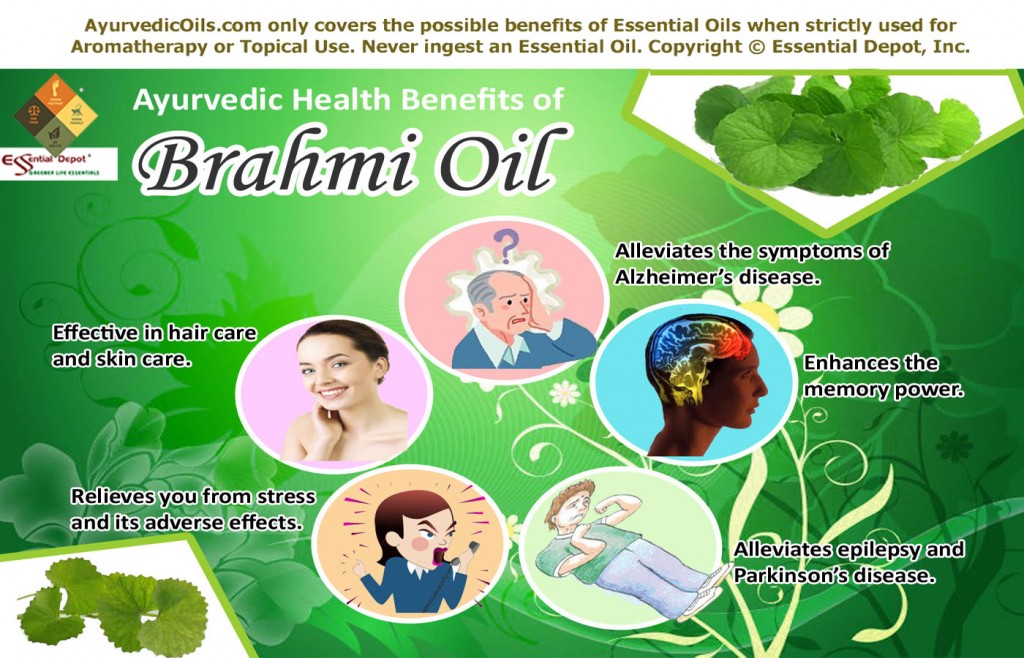 1. Alleviates the symptoms of Alzheimer’s disease:
1. Alleviates the symptoms of Alzheimer’s disease:
As a divine blessing to numerous diseases related to the brain and nerves, Brahmi essential oil is indeed one of the most effective natural cure for Alzheimer’s disease and is often portrayed by neuropsychiatric and behavioral changes where a person suffers from memory loss along with losing the ability to think and speak, completely reliable on caregivers in the most advanced stage. With no accurate cure, the symptoms worsen with the progress of the disease and it eventually leads to the death of a person.
With natural sulfhydryl and polyphenols, Brahmi oil possesses endogenous antioxidant and anti-cholinesterase attributes with the help of which it inhibits the acetyl cholinesterase enzyme and reverses the symptoms of amnesia, enhances cognition and acts as a neuroprotectant against Alzheimer’s disease.
Moreover, researches have proved the efficiency of Brahmi oil in reducing the beta-amyloid deposits found in the brain of rats with Alzheimer’s disease induced by anti-cholinergic drugs. The presence of saponins helps in increasing the level of serotonin while decreasing that of dopamine widely aiding in memory retention.
With its anti-oxidant properties, Brahmi oil reduces the reactive oxygen scavengers, divalent metals, suppresses the lipoxygenase activity and decreases the formation of lipid peroxides thus greatly helping in alleviating various hazardous symptoms of Alzheimer’s disease in the long run.
Meditating by focusing the mind on Agna or the point below the center of the forehead, appropriately in between the eyebrows, is the best way to improve concentration, activate the brain cells, enhance memory power, grant increased sense of awareness, provide absolute control over senses, and promotes the power of concentration.
This point is connected to the pituitary gland and is associated with the life-force. Adding 2 drops of Brahmi oil in diffuser or vaporizer during Agna meditation helps in treating Alzheimer’s disease and is a boon to people suffering from all kinds of brain disorders.
2. Enhances the memory power:
Brahmi oil is Mother Nature’s gift for supporting cognitive enhancement and neuro-protective attributes. This is attributed to the rich content of saponins such as Bacoside A and B. It actively influences in regulating the levels of dopamine and serotonin, the neurotransmitters released by the nerve cells that pass on signals to other nerve cells that help in motor control, secretion of hormones and is the contributor of feeling of well being and happiness that makes you feel secure and complete.
With its antioxidant properties, it induces cell transport, metabolism of 5-HT and Tryptophan Hydroxylase (TPH2) resulting in providing a protective environment for the cells and promoting the neuron communication. It helps in increasing the branching points in the neurons and the dendritic intersections that results in the neuronal growth in hippocampus, the area in brain associated with enhancing memory retention and improvement in the learning performance.
This also results in increasing the encoding of information in the brain with increased retention speeds, improving delayed recall and verbal learning. All these aspects of Brahmi essential oil make it an excellent aid when administered along with Ashwagandha, Centella Asiatica and Melissa Officinalis for children with attention deficit hyperactivity disorder (ADHD).
It is for this reason, Brahmi oil has been in existence since primordial times in the field of holistic healing as a powerful memory enhancer to increase the speed of processing information and cognition and decrease the performance time, reaction time and error incidence for people of all ages especially children for good progress in the field of academic learning.
Adding 2 drops of Brahmi oil to a cotton ball and keeping it besides you during the study time or during your classes can aid in improving your memory power, enhancing concentration and helping you focus on things that you work upon without any deviation.
3. Alleviates epilepsy and Parkinson’s disease:
Often characterized by undetectable periods of vigorous shaking, epilepsy is a group of long-term neurological disorders. With Bacoside –A as the major component, Brahmi essential oil is often paired with Ghee in Ayurveda to treat epilepsy by reducing the occurrence of convulsion.
It induces changes in specific parts of the brain such as striatum and the hippocampus to mediate the reducing activity of the epileptic seizures. Brahmi oil greatly influences the expression of mGluR8 receptors which possess protective mechanism against excito toxicity and hyper excitation.
Additionally, Brahmi oil prevents the depletion of dopamine and serotonin and greatly reduces the death of cells in the midbrain that generate dopamine, which remains as one of the causes of Parkinson’s disease.
Numerous researches carried out in this regard confirmed the positive reduction of the depletion of serotonin and dopamine in rats subjected to chronic stress and supplemented with Bacopa monnieri. It has also been proved that the presence of Brahmi oil prevented the depletion of dopamine even in cases of neurotoxicity induced with rotenone and caffeine.
4. Relieves you from stress and its adverse effects:
Stress simply leads to mental and physical exhaustion, while it drains out all our energy and confidence. Having all the beneficial saponins and phyto chemicals in possession, Brahmi oil acts as a natural adaptogen actively preventing the biochemical effects of stress and blocking the stress response in the body.
It effectively reduces the expression of HSP70, a biomarker of stress in almost all the regions of the brain in particular the hippocampus and the cerebellum. Brahmi oil also increases the anti-oxidant enzymes such as superoxide dismutase, catalase and glutathione peroxide in the brain protecting it from oxidative damage and other stress related factors.
It aids in overcoming acute and chronic stress. In addition to that this oil for the mind helps one in overcoming addiction to ill habits such as drug dependence, smoking, alcoholism etc. Furthermore, Brahmi oil assists in reducing the inflammation in the nerves and possesses neurological anti-aging effect.
With the presence of bacopaside I, bacopaside II and bacopasaponsin C, Brahmi oil naturally alleviates depression and anxiety. Just a gentle massage with Brahmi oil effectively relieves you from tension and fear and provides you a peaceful sleep. It lifts up your spirits and soothes your mind by calming down the nerves with a promise to provide you an eternal elevation.
The best way to alleviate stress is to blend 5 drops of Brahmi oil with 5 drops of Sandalwood oil, 5 drops of Lavender oil and 5 drops of Ylang Ylang oil with 10 ml of Virgin olive oil and massage your system followed by a warm bath diluted with 3 drops of Brahmi oil especially before going to bed can help you in relaxing your nerves, soothing your muscles, alleviating fatigue mentally and physically and grant you the determination to fight stress and its ill effects.
5. Effective in hair care and skin care:
Healthy hair and skin are indeed the lustrous assets of every human being. With natural antioxidants, Brahmi oil rejuvenates the hair follicles and strengthens the hair from the roots. It acts as a cure to numerous problems related to hair and scalp such as dandruff, split ends, itchiness in the scalp and formation of flakes.
“Brahmi is excellent for hair growth and the prevention of baldness”, says Bryan Miller and Light Miller in their book Ayurveda and Aromatherapy. With its nourishing properties, Brahmi oil aids in lessening hair fall and promotes hair growth aiding in the treatment of Alopecia Areata. In combination with Amla, it promotes the blood circulation in the scalp; it aids in restoring the natural color of the hair and prevents premature graying.
Massaging your scalp and hair with 2 drops of Brahmi oil along with 2 drops of Jatamansi oil, 2 drops of Rosemary oil and 2 drops of Tea tree oil with 5 ml of Almond oil followed by regular shampooing with 1 drop of Brahmi oil to your mild shampoo, can assist in controlling hair loss, clear dandruff, nourish the scalp, strengthen your hair from the roots and gift you with long, lustrous and shiny locks.
The antioxidant attribute of Brahmi oil mainly due to the presence of flavonoids, alkaloids and saponins also contribute to the utilization of this essential oil in the field of skin care as a revitalizing agent. It helps in tightening the pores and keeps the cells in tact by preventing the formation of wrinkles and treats numerous skin problems such as boils, psoriasis, abscess, eczema and pimples.
Mix 1 drop of Brahmi oil with 1 drop of Sandalwood oil, 1drop of Rose oil and 1 drop of Lavender oil with 2 ml of coconut oil and massage it on your facial skin in gentle circular movements for visible results. It also promotes the growth of nails.
Other health benefits of Brahmi oil:
Brahmi oil possesses stomachic properties that assist in protecting against ulcers by repairing and preventing the lining of the stomach from the advent of acids and enzymes.
It aids in protecting against the risk factors of cardiovascular diseases by helping in oxidizing the fats in the body. Brahmi oil also acts a diuretic and helps in removing excess toxins from the body in the form of urine and sweat. It acts as a cardio-tonic, nerve tonic and as an analgesic helping you to relieve from pain.
Disclaimer:
This article is just for educational uses and is not destined to check, treat or diagnose any medical condition or replace with any prescription medicines or expert medical advice. We are not medical professionals and this data is shared only with the idea of throwing light on the significance of Ayurveda, the time-honored wisdom of holistic healing.
Internal use of essential oils is strictly restricted except under medical supervision. Make certain that you dilute essential oils before using it topically because pure and organic essential oils are highly concentrated liquids and direct application on the skin may cause allergic reactions. It is always recommended to speak with your Ayurvedic expert/ healthcare professional before choosing the suitable essential oils for your prakriti or unique individual constitution and your medical condition.
Thought for the day:
Perhaps nature is our best assurance of immortality. -Eleanor Roosevelt
Suggested Reading:
- Brahmi – the brain tonic by Brijesh Regal
- Nutrient Management in Brahmi (Bacopa monnieri L.) by Vineeta Rathore, Kuldeep Singh, Vandana Rathore
- Ashwagandha & Brahmi – Withania somnifera and bacopa monnieri – The most powerful brain-boosting herbs in Ayurvedic Medicine by James Lee
- Ayurveda and the Mind: The Healing of Consciousness by Dr. David Frawley
- Road to Recovery from Parkinsons Disease by Robert Rodgers
Reference Links:
- Bacopa monnieri by Wikipedia
- A research article on ‘Bacopa monniera -a Future Perspective’ by the International Journal of Pharmaceutical Sciences and Drug Research
- Enhanced dendritic arborization of hippocampal CA3 neurons by Bacopa monniera extract treatment in adult rats published in PubMed
- Bacopa monniera on stress induced changes in plasma corticosterone and brain monoamines in rats published in PubMed

